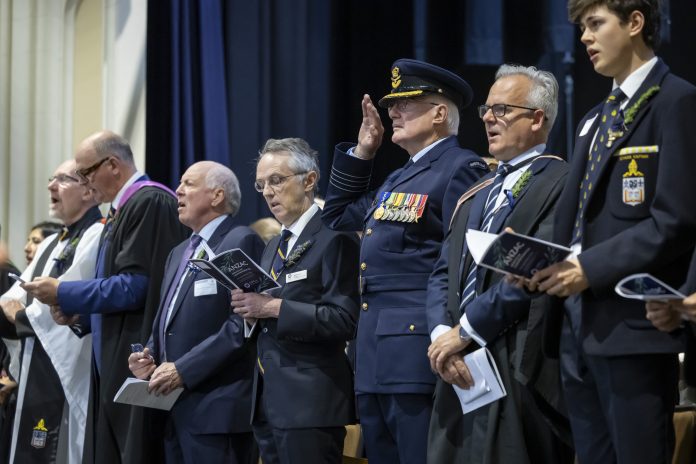On Monday 28 April 2025, Melbourne Grammar School gathered for the annual ANZAC Service of Commemoration to honour the 2,651 Old Melburnians who served in the World Wars. This annual occasion brings together students, staff, Old Melburnians, and their families in a whole-school service, with Captains and Vice Captains from Grimwade House, Wadhurst and Senior School playing a central role. Following the service, invited guests shared lunch in the Morrow Room.
The Memorial Address was given by Martin Scott KC (OM 1980), President of The Old Melburnians, and a copy can be viewed below and here.
On this solemn occasion, it is appropriate for each of us to ask ourselves a simple question. What is my purpose at this service? After all, the men we gather to remember this morning died a long time ago. And we, you and I, never knew them. It is a question that has been on my mind since I sat where you now sit, many years ago.
This morning I will offer you my answer to the question.
I start with the place. All of us know this is no ordinary school hall. It is after all The Old Melburnians’ War Memorial Hall, the gift of the First World War generation of a century ago.
If you are anything like I was at school, you walk past it a dozen times a day. Never give its origins or purpose a second thought. That is exactly as they would have it. This Hall is not a mausoleum. Or a shrine. It is a place where the life of the School is meant to be lived.
But once a year they call on you, the living School, to come here for a different purpose. For this service of commemoration. Some of you may recall that this was a condition of their gift. But why? What did they think it would achieve, especially after all these years?
Perhaps they point the way to their answer in the second condition of the gift. Few have heard of it. It is a little wordy. It’s to the effect that there is to be no separate memorial here to any individual who served. What it means is that there are no names except the names of the fallen in the Sanctuary at the entrance. And those names are recorded without reference to rank or distinction. Why?
I hold in my hands a treasured possession that points the way to the answer for me. It is a book I found quite by accident many years ago in a second hand-book shop. Its title is War Services, Old Melburnians 1914-1918. It is the story of the generation that built this Hall, written by them, about themselves, in their own words. I had never even heard of it, yet it is literally at the heart of this place. A copy sits underneath the foundation stone. A second copy is on permanent display in the Sanctuary.
At the front are collected some bare facts about them. 1,353 Old Melburnians served in the First World War. In those days, the School was a lot smaller. 1,353 was the equivalent of every leaver for more than 10 years going to war. And of those 1,353, the book records that 207 fell. The equivalent of two entire years, gone. Imagine that, if you can, looking down the rows of seats in this Hall this morning. For those who built this Hall of course, no imagination was required.
Also at the front, some facts about their service. Old Melburnians held the rank of Admiral, General, naval captain, colonel and so on. Fully half of the 1,353 served as commissioned officers, some rising from the lowest rank of private. One Old Melburnian held the distinction of being appointed aide-de-camp to the King himself.
And decorations. A Victoria Cross. As you know the highest award. For valour. And over 100 Military Crosses. In those days the second highest decoration awarded to junior officers, the rank at which most Old Melburnians served. And a number of those Military Crosses, Military Cross with Bar. That is, the same man awarded the same high decoration for bravery more than once. But if they survived, with two exceptions, you will not find their names anywhere in this Hall.
The Hall then is not a monument to martial glory. But what else does the book tell us about why we are here?
The book was published in 1923, five years after the cessation of hostilities, five years before this Hall was consecrated. No doubt the sense of grief was very real and present.
The President of the Old Melburnians at the time put his name and signature to its Preface. And his story is I think illuminating.
He was an officer who saw distinguished service at Gallipoli. He was decorated, receiving the Military Cross and the French equivalent. And he was severely wounded in the course of his service, sustaining injuries that plagued him for the rest of his life.
To make him slightly more relatable, when he was at School (not so many years before), he was in the 1st XI cricket (and Captain of it), the 1st XVIII football (and Captain of it), the 1st VIII (and he was Captain of Boats), and he was in the athletics team. And he was captain of that as well. Perhaps unsurprisingly, according to the norms of his day, he was also School Captain.
But he did not have it all his own way. He lost his younger brother and his father in his last two years at School, his mother and sister just before the war and then his older brother to war injuries. At the same time, he battled to save the family business from ruin.
And yet he carried on. At the same time he put his name to this book in his capacity as President of the Old Melburnians, he also held the office of Prime Minister of Australia. Later he went on to represent this country at the League of Nations and then to Chair that body, and then at the Imperial War Council in London during the darkest days of World War 2 (at which he argued repeatedly and forcefully with Winston Churchill for the repatriation of Australian soldiers to defend this country). And after that war he chaired the United Nations Commission that saved Europe from starvation.
And he did many other things besides. He was in fact the first Australian born person to sit in the House of Lords in London, in those long ago days the pinnacle of achievement in public life. But he was not the last. Two other Old Melburnians who also saw distinguished service in the first war were also later appointed to the House of Lords.
But back to him. One question you might consider along the way. Why would a man like that, someone drawn to achievement in public life, to the highest offices of State, a man who won all the glittering prizes, why would such a men insist on being forgotten here?
I find the answer to that question in the same place I am certain he found it. It is in the Order of Service you hold in your hands. I invite you to turn to page 17. There you will find the commencement, for it is only the commencement, of the names of the fallen from the first war. It is followed by the list for the second war, an even longer list.
Take a moment to look at the names.
You can be forgiven for thinking they are just names to you and to me. After all, as I said, they died a long time ago. But you would understand that to those who built this Hall, looking at exactly the same names you are now looking at, each name summoned up a memory. A memory of a face. A voice. A life cut short.
Let me tell you briefly the story of one of them. Arthur O’Hara-Wood.
Arthur O’Hara-Wood has a singular and tragic distinction. His name appears in two places in this Hall. In the Sanctuary. And on the honour board for Heads of School. He was Exhibitioner in Physics and Classics. He was also the School and APS tennis Champion and played in the 1st XI cricket and 1st XVIII.
After School, Arthur went up to the University to study medicine, where he won more prizes. And whilst a resident of Trinity College achieved the exceptionally rare distinction of being awarded a triple Blue in sport by the University.
When war broke out in 1914, Arthur was training to be a surgeon at the Alfred Hospital. But he still found time to win the tennis championships of Victoria, New South Wales and Australia.
Arthur O’Hara-Wood did not serve as a doctor in WWI. He learnt how to fly, and from 1915 served as a pilot in France, rising to command the Australian flight.
Arthur O’Hara-Wood died of injuries sustained when he was shot down in October 1918, four weeks before the end of the war.
I mentioned before three prominent Old Melburnians of his generation. The ones who served, survived and were later appointed to the House of Lords.
They knew Arthur well. Two of them in fact were in the same year at School as him. And the three of them went on to Trinity College together after School. You can assume the bond was close. That is the way of the common path.
When those three Old Melburnians and others of their generation saw this Hall, they did not see a building. They saw Arthur O’Hara-Wood, and many others besides. If you ever wonder what propels men to strive for success in life having been spared, now you know. It has a name. In their case, 207 names.
And what would he say to today if they were here today instead of me? I think, something along these lines.
One day, when your time here as a student is at an end, you will follow in their footsteps. You will walk out the School gates for the last time. And in that moment, you will become (as they became in their day) an Old Melburnian.
What that means is for each generation to decide for itself. And that is not a responsibility to be taken lightly. But whatever your generation decides, you will discover, as all those who have gone before you have discovered (sometimes to their surprise), you will always have a common bond, a common loyalty. With each other, whatever your personal differences. With other Old Melburnians. And even with these men of long ago in this Order of Service.
If you doubt that, read this book. If you want to understand this place and why it was built. If you want to understand this School. If you want to know why they are important, then this book from long ago tells you everything you really need to know.
That is what they might say, those who wrote the book. And what can I add as someone who has read it, that I would share with you?
A simple truth. And that truth is that these names in this Order of Service are not just names to you or to me. They are in every material respect the names of our brothers. And they are our brothers to mourn.
And that is my answer. That is why we are here. But more importantly, that is why and how we should remember them.
Lest we forget.



